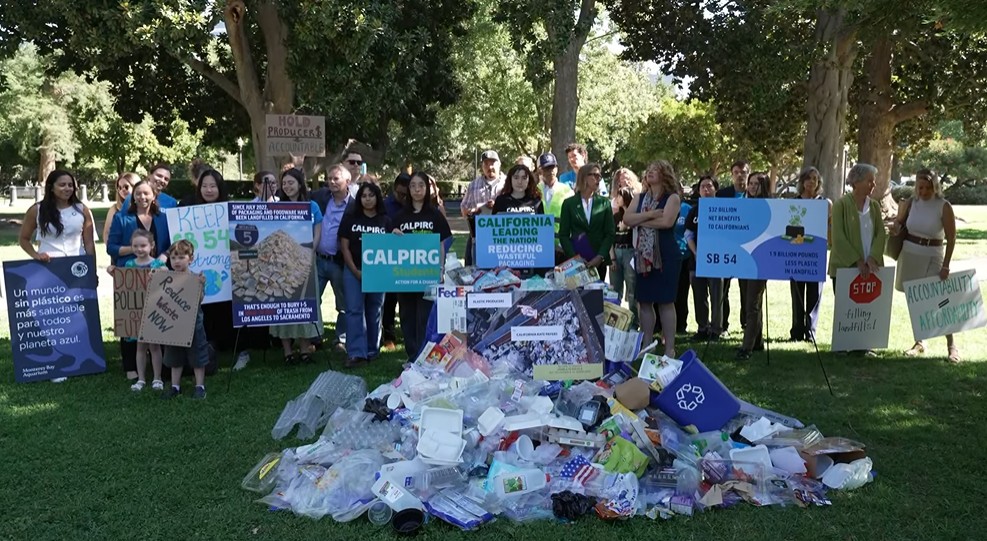
A coalition of environmental groups and state lawmakers on Tuesday called on Gov. Gavin Newsom to put in place tougher rules to reduce plastic pollution in the oceans and across California’s landscape, five months after he halted proposed new regulations that plastics companies opposed.
At a news conference outside the state Capitol building featuring a large pile of plastic food containers, bubble wrap and other used plastic packaging, the environmentalists said Tuesday that under industry pressure, the Newsom administration has weakened proposed rules that the California Department of Resources Recycling and Recovery, known as CalRecycle, drafted after he signed a landmark law, SB 54, three years ago.
That first-in-the-nation law set targets to force companies to use less plastic in packaging at supermarkets, retail stores and other outlets, and to pay to recycle and recover much of it — costs that are now shouldered mostly by cities and taxpayers through municipal recycling programs.
“The oceans are choking on plastic,” said Tara Brock, an attorney with Oceana, an environmental group with offices in Monterey and Sacramento. “An estimated 33 billion pounds of plastic enter the marine environment each year. That’s equivalent to two garbage trucks dumping plastic into the ocean every minute. The impact on the environment and our communities cannot be overstated.”
Related Articles
Opinion: Big Oil’s recycling lies are well documented. We need accountability.
Alameda County DA, air district sue Radius Recycling over massive 2023 blaze
Oakland pulls plug on California Waste Solutions land deal at former Army base
In March, Newsom halted new draft regulations that CalRecycle had drawn up after two years of public meetings and studies.
At the time, Newsom’s former director of that department, Rachel Wagoner, had become California director for one of the industry groups lobbying for more flexibility in the rules. That industry group, the Circular Action Alliance, is a coalition of food, beverage and retail companies including Amazon, Coca Cola, General Mills, Kraft-Heinz, Nestle, Proctor and Gamble, Target, and WalMart. Wagoner also worked previously as Newsom’s deputy legislative secretary.
The industry alliance said the new rules could cost $300 per family per year.
Two months later, CalRecycle issued new rules in May which were less stringent.
On Tuesday, Newsom’s office said he is trying to strike a balance.
“Governor Newsom was clear when he asked CalRecycle to restart these regulations that they should work to minimize costs for small businesses and families,” said Daniel Villaseñor, a Newsom spokesman. “These rules are a step in the right direction — while ensuring California’s bold recycling law can achieve its goal of cutting plastic pollution. We look forward to continued public engagement.”
The industry alliance did not respond immediately Tuesday to a request for comment. But in March, another industry group, the Plastics Industry Association, praised Newsom’s move to rewrite the rules.
“Achievable, balanced policies require collaboration, not rushed regulations that create unintended consequences for Californians,” said Matt Seaholm, president and CEO of the association.
Supporters of the original rules oppose several key changes. Among them: allowing over-the-counter medications to be exempt, more exemptions for agricultural products, and to allow chemical processes that break down plastics to count as recycling.
On Tuesday a coalition of 33 environmental organizations, including Save the Bay, the Monterey Bay Aquarium, the Surfrider Foundation, Californians Against Waste, and San Francisco Baykeeper sent a letter to Newsom and Yana Garcia, the secretary of the state Environmental Protection Agency, urging stronger plastic rules.
“Facilities operating solvent-based and thermal processes are marketed as “chemical recycling” or “advanced recycling,” the letter said, “but in practice, most of them are not recycling at all. At best, they are a new euphemism for an old and dirty practice: incineration.”
Plastic waste has become one of the world’s major environmental problems.
Less than 10% of plastics is recycled in the United States every year. Millions of tons from countries all over the world end up in the ocean, where it kills fish, birds, sea turtles, whales and dolphins that eat it or become entangled by it.
Making plastic consumes large amounts of petroleum products, which contributes to climate change. And it can last hundreds of years.
In 2022, after several years of debate in Sacramento, state lawmakers passed and Newsom signed a landmark plastics law, SB 54. That law required plastics and packaging companies to shoulder much of the burden for addressing the growing mountains of plastic waste. By 2032, they were required to reduce single-use plastic packaging by 25% and guarantee that 65% is recyclable and 100% either recyclable or compostable.
They could do that by funding recycling programs, reducing the amount of plastic in their packaging, or changing the types of plastics they used.
The law also banned polystyrene food containers like cups, plates and clamshell boxes, commonly known as Styrofoam, statewide, effective Jan. 1 of this year. Environmentalists say the Newsom administration has been slow to enforce that new prohibition, however, and that some products are still found on store shelves.
Frustrated with slow action on the plastics issue, environmental groups qualified a statewide ballot measure in 2022 to impose a 1-cent tax on each plastic package — from Advil bottles to plastic strawberry boxes at supermarkets — with the $1.2 billion it would have raised from industry going to expand state recycling programs.
However, they withdrew the measure in a compromise with industry and lawmakers to get SB 54 passed. Some environmental groups say if the Newsom administration doesn’t pass sufficiently strong regulations to implement the law, they will consider filing lawsuits or placing the same measure on the 2026 ballot.
“We have multiple tools in the tool box and we are going to look at every one,” said Mark Murray, executive director of Californians Against Waste, a recycling advocacy group.